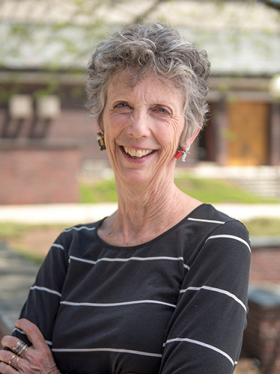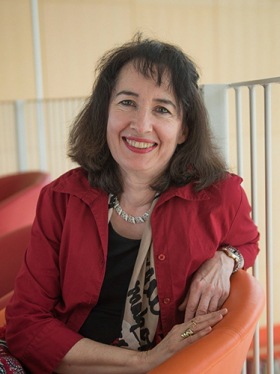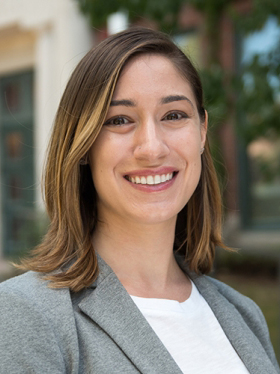Gifted Teaching: Meet the 2019 Sherrerd Prize Recipients
News of Note

Published October 17, 2019
The recipients of this year’s Sherrerd teaching prizes are “dynamic,” “original” and “compassionate,” in the words of their student nominators—educators whose presence in the classroom is “a gift to this institution.”
The 2019 award recipients are Randi Garcia, assistant professor of psychology and statistical and data sciences; Judith Keyler-Mayer, senior lecturer in German studies; and Kiki Smith ’71, professor of theatre.
The three faculty members will be celebrated at a ceremony open to the campus community on Monday, Oct. 28, at 4:30 p.m. in the Campus Center Carroll Room. A reception will follow in Wilson Atrium.
The Kathleen Compton Sherrerd ’54 and John J. F. Sherrerd Prizes for Distinguished Teaching were established in 2009 to recognize outstanding teaching at Smith. Each year, students, faculty and alumnae nominate educators who exemplify excellence and inspire their students—both inside and outside of the classroom.
We asked this year’s award recipients to reflect briefly on their teaching. Here’s what they had to say:
What sparked your interest in becoming an educator?
Kiki Smith ’71, professor of theatre
 “I didn’t set out to teach. I came here as a one-year sabbatical replacement, fresh out of graduate school. Forty-five years later, I’m still here. It’s the students who keep me coming back to my underground office and costume shop. I get to teach students of all ages and all disciplines. Their breadth of interests and experiences connect me to topics and resources that enrich my work. What I relish is the uniqueness of each one of these students who expresses her own perspective on the characters and plays through her designs. Or the research intern who finds her own niche of historic clothes or accessories to study. I’ve had opportunities to work at outstanding museums with renowned clothing collections. But I missed the students too much to stay in those rarified worlds. I discovered theatre design in my junior year at Smith. I loved every part of the process— and still do. And I still relish the chance to share this field with a group of sharp, eager and insightful young women.”
“I didn’t set out to teach. I came here as a one-year sabbatical replacement, fresh out of graduate school. Forty-five years later, I’m still here. It’s the students who keep me coming back to my underground office and costume shop. I get to teach students of all ages and all disciplines. Their breadth of interests and experiences connect me to topics and resources that enrich my work. What I relish is the uniqueness of each one of these students who expresses her own perspective on the characters and plays through her designs. Or the research intern who finds her own niche of historic clothes or accessories to study. I’ve had opportunities to work at outstanding museums with renowned clothing collections. But I missed the students too much to stay in those rarified worlds. I discovered theatre design in my junior year at Smith. I loved every part of the process— and still do. And I still relish the chance to share this field with a group of sharp, eager and insightful young women.”
What do you feel are the key qualities needed for effective teaching?
Judith Keyler-Mayer, senior lecturer in German studies
 “My ideals are meticulous preparation, glass-clear explanation and energetic presentation. I try to work on my teaching qualities by actively staying in the process of language learning myself. Sitting in a classroom as a willing but not necessarily successful student myself allows me not only to observe other language teachers’ approach, style and tricks, but also to experience the joys and frustrations that come with studying a language. I think this perspective helps me to keep my class contents, pace and expectations realistic. Some students surprise me with questions I have never thought about, and they send me right back to my books. I am most impressed with students who come to Smith with different mother tongues than English. Many of them are living examples for what I would like to convey in my classes: The ability to think, to express oneself and to act from the angle of a different language and culture.”
“My ideals are meticulous preparation, glass-clear explanation and energetic presentation. I try to work on my teaching qualities by actively staying in the process of language learning myself. Sitting in a classroom as a willing but not necessarily successful student myself allows me not only to observe other language teachers’ approach, style and tricks, but also to experience the joys and frustrations that come with studying a language. I think this perspective helps me to keep my class contents, pace and expectations realistic. Some students surprise me with questions I have never thought about, and they send me right back to my books. I am most impressed with students who come to Smith with different mother tongues than English. Many of them are living examples for what I would like to convey in my classes: The ability to think, to express oneself and to act from the angle of a different language and culture.”
What keeps you inspired about teaching?
Randi Garcia, assistant professor of psychology and statistical and data sciences
 “Definitely the Smithies! With such an amazing group of ambitious, conscientious, intelligent people as students, I know that I need to rise to the challenge and show up for them every day. Smithies are serious about their education, and their dedication keeps me inspired to provide them guidance through that education. I feel most effective in my teaching when I can understand exactly where students are at with the material and what might be the exact explanation/activity that moves them towards deep learning. The only way to truly know where they’re at is to talk with them—to get to know them, try some stuff, check in with them to see how it felt, try again. I also feel particularly inspired by teaching statistics and data science at a women’s college at this point in history. I see the world changing rapidly with data models increasingly being incorporated into our daily lives, and I think it’s crucial for Smithies to be at the table discussing the ethics of these models.”
“Definitely the Smithies! With such an amazing group of ambitious, conscientious, intelligent people as students, I know that I need to rise to the challenge and show up for them every day. Smithies are serious about their education, and their dedication keeps me inspired to provide them guidance through that education. I feel most effective in my teaching when I can understand exactly where students are at with the material and what might be the exact explanation/activity that moves them towards deep learning. The only way to truly know where they’re at is to talk with them—to get to know them, try some stuff, check in with them to see how it felt, try again. I also feel particularly inspired by teaching statistics and data science at a women’s college at this point in history. I see the world changing rapidly with data models increasingly being incorporated into our daily lives, and I think it’s crucial for Smithies to be at the table discussing the ethics of these models.”